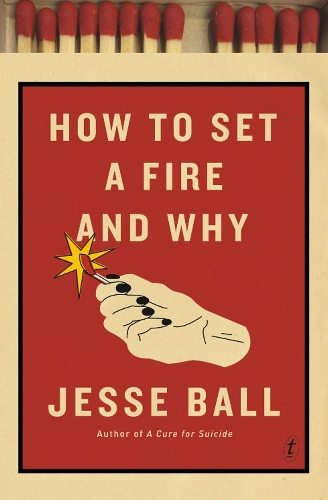
How To Set A Fire And Why
(Paperback, UK ed.)
Publishing Details
How To Set A Fire And Why
By (Author) Jesse Ball
Text Publishing
The Text Publishing Company
24th February 2016
UK ed.
Australia
Classifications
General
Fiction
813.6
Physical Properties
Paperback
294
Width 154mm, Height 234mm
389g
Description
Fourteen-year-old Lucia is a young narrator whose voice will long ring in your ears. She is angry with almost everyone, especially people who tell her what to do. She follows the one rule that makes any sense to her: Don't Do Things You Aren't Proud Of. Orphaned and living with her elderly aunt in poverty in the converted garage of a large mansion, Lucia makes her way through the world with only a book, a Zippo lighter, and a pocket full of stolen licorice. How to Set a Fire and Why announces the arrival of an astounding new teenaged narrator.
Reviews
'I was captivated from the first line...Lucia belongs with all the great child truth tellers: David Copperfield, Huck Finn, Holden Caulfield...I loved her and I loved the book, every page of it.' -- Peter Heller author of The Dog Stars and The Painter 'A young genius who hits all of the right notes.' Chicago Tribune '[Lucia] is a Holden Caulfield for a post-cultural studies generation.' Saturday Paper 'Ball's take on the teen voice rings absolutely true-a potent mix of directness, self-deception and biting wit...Halfway between Catcher in the Rye and Fight Club, but funnier than either.' Weekly Review 'For a young writer, Jesse Ball's output has been incredibly prolific. We're getting to the point where it's almost impossible for him to release a bad book. His works, though wildly different, are always mysterious, puzzling and incredibly interesting. How to Set a Fire and Why is no exception.' Readings '[Ball]'s both moral and whimsical, playfully experimenting with style and humour while fixated on the devastating effect of personal actions...Articulating a heartbreaking range of emotions with newfound accessibility, How to Set a Fire and Why deserves to be this cult author's commercial breakout.' Big Issue 'In Jesse Ball's writing, there's no visible effort to create poetry. Yet there's beauty in the simplicity, in the story that's told, in the plight of one girl to find what's true.' Age/Sydney Morning Herald 'In an age of blindly interchangeable YA narrators, this novel is a song of teenage heartbreak sung with a movingly particular sadness, a mature mediation on how actually say something, not just speaking, is what most makes a voice human.' STARRED Review, Publishers Weekly 'An engaging and compassionate tale of loss, inequality and disaffected youth.' Annethology 'Jesse Ball has written an unforgettably memorable character in the pyromaniac Lucia, who anyone who was once a cynical teenager will recognize and relate to.' Buzzfeed 'Spare and elliptical, frog-hopping from scene to scene, making stories that aren't plot-driven into page-turners.' Huffington Post 'Jesse Ball is known for his experimental styles, but this epistolary novel of a troubled teen girl in written with a more accessible approach but still delivers on wit, humor, and unexpected plot twists.' Book Riot 'This tension surrounding the question of which future Lucia will pursue drives the novel's overarching narrative: books or fire, creation or destruction...As Lucia teeters between these opposing paths, her internal monologue is both brooding and delightfully sardonic, cycling through countless rhetorical gags and biting observations that are often revelatory in their recognition of society's endless absurdities.' LA Review of Books 'Contemporary fiction with adolescent narrators risks either being cliched and cloying, or convincing and rebarbative. But Jesse Ball's latest novel, How To Set a Fire and Why, ventures an adolescent narrator who is both believable and bearable... In Jesse Ball's hands, Lucia's childlike simplicity manifests itself as a sort of refreshing perspicacity.' Times Literary Supplement
Author Bio
Jesse Ball is the author of five other novels: Samedi the Deafness, The Way Through Doors, The Curfew, Silence Once Begun and A Cure for Suicide. He was a finalist for the 2015 New York Public Library Young Lions Fiction Award and a 2014 Los Angeles Times Book Prize. Ball is a 2016 Guggenheim Fellow. He received an NEA creative writing fellowship for 2014 and the 2008 Paris Review Plimpton Prize. His verse has been included in the Best American Poetry series. He gives classes on lucid dreaming and lying at the School of the Art Institute of Chicago.
